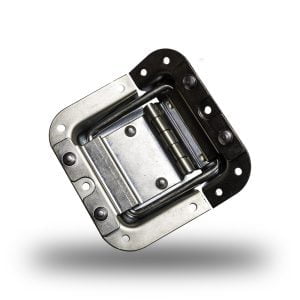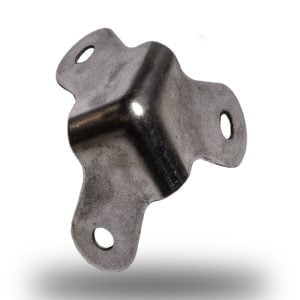A construction supervisor in Mpumalanga watched—again—as another field toolkit handle snapped mid-lift. The case spilled across gravel, tools scattered, and progress halted. It wasn’t just a nuisance. It meant downtime, safety risks, and budget strain. Imported gear, though available, wasn’t standing up to South-African working conditions.
In sectors where equipment moves daily—construction, utilities, diagnostics—suitcase accessories aren’t optional extras. They’re essential components. From hinges and handles to brackets and gliders, choosing the right accessories can mean the difference between reliable transport and repeat replacements.
 Built for the Load: Handles That Work as Hard as You Do
Built for the Load: Handles That Work as Hard as You Do
Heavy kits are standard on-site. Pulling, lifting, or dragging them puts consistent strain on suitcase handles. Many overseas models aren’t designed for the 20–30 kg payloads common in SA field use.
The solution? Heavy Duty Handles built for industrial duty.
These are reinforced with steel inserts, feature non-slip textured grips, and mount securely to MDF or aluminium frames. Unlike plastic variants that crack in the cold or soften in summer heat, these are rated for both UV and mechanical resilience.
- Available in fixed or fold-down models
- Ergonomic design reduces wrist strain
- Tested to support static and dynamic load over 25 kg (ISO 9227, 2023)
A Gauteng manufacturer of mobile water testing labs shifted all case production to local supply. Their rejection rate dropped by 40% once switching to heavy-duty South-African handles—highlighting the cost of false economy.
How many handle failures can your site absorb before productivity drops?
Hinges: Precision Where It Matters Most
A hinge failure compromises the whole unit. With South-African climate stresses—dryness in the Karoo, humidity on the KZN coast—cheap or untreated metals simply don’t last.
Venture Products supplies stainless steel and zinc-coated hinges built for repeat use and environmental exposure. These suit metal or MDF case lids, available in flush-mount or surface-mount configurations.
- No sag over time with correct installation
- Ideal for technician cases and mobile control units
- Coated for SABS 935-2 anti-corrosion compliance
When the Johannesburg EMS upgraded its diagnostic case fleet, it specified local hinges to avoid the latch-hinge warping seen with imported versions. Result? Fewer replacements, better lid alignment, and improved technician safety.
 Glider Feet: The Unsung Hero of Case Longevity
Glider Feet: The Unsung Hero of Case Longevity
Dragging or stacking cases causes friction damage over time. Without glider feet, bottom edges wear through or crack—especially with repeated movement on rough flooring or vehicle loading bays.
Black Polymer Glider Feet absorb impact and reduce slip.
- UV-stable, hard plastic moulded with steel screw points
- Protects wood-based boards and aluminium chassis
- Extends useful lifespan by shielding edges from wear
Even clients on tight ZAR budgets noted the long-term value: a Cape Town electronics distributor avoided replacing 200+ case shells annually simply by adding glider feet.
If a R10 component saves a R600 rebuild, isn’t it worth including?
Corner Brackets: Structural Strength on Impact
Field cases face knocks. Corner brackets don’t just look neat—they reinforce against the worst kinds of damage: impacts that crack seams or delaminate panels.
 Galvanised Steel Corner Brackets absorb and redistribute force on drops.
Galvanised Steel Corner Brackets absorb and redistribute force on drops.
- Designed for MDF, ply, and aluminium
- Corrosion-resistant for coastal use
- Pre-drilled or custom lengths available
One Durban-based panel installer reported zero field damage after fitting steel brackets to 75 new control cases—down from nearly 30% breakage in the previous model year.
What happens when your corners fail before your tools?
Lid Stops: Protection From Over-Opening
Without lid stops, hinged cases open too far—straining fasteners and cables. With delicate or embedded electronics, one hard overextension can wreck critical connections.
Cable Lid Stops provide controlled opening arcs and internal cable protection.
- Stainless braided wire won’t corrode or snap
- Customisable length for lid angle control
- Fixed with rivets or bolts to suit application
Used widely in the solar installation industry, these stops help maintain control of equipment layout during windy on-site conditions, especially in open vehicle trays.
If your lid breaks your cables, your case becomes a liability.
Latches: When Secure Means More Than Closed
Cases that pop open during transit expose equipment to loss or damage. Toggle latches from Venture Products keep things tight—yet accessible.
Available with spring tensioners or padlock loops, these latches are ideal for cases carrying:
- Surveying instruments
- Tool sets
- Battery-powered tech with removable parts
With ISO 9001 manufacturing standards and tension calibration options, toggle latches remain a top choice for site operators who can’t afford mid-transit failures.
FAQ:
Q: Are all suitcase accessories SABS approved?
A: Most meet or exceed SABS 0157 and ISO 9227 standards for fastener integrity and corrosion resistance.
Q: Do you offer stainless steel variants for coastal use?
A: Yes, including hinges, lid stops, and toggle latches suitable for humid and marine climates.
Q: Can I request custom dimensions?
A: Yes, Venture Products accommodates bulk orders with tailored sizes and mounting options.
Q: What’s the expected lead time for medium-volume orders?
A: Stock items dispatch in 2–3 working days. Custom runs take 5–10 days.
Q: Do accessories come with datasheets or technical drawings?
A: Most items have downloadable specs and mounting templates upon request.
Q: What is the load capacity of the standard pull handle?
A: Load-rated to 25–30 kg static, tested under ISO protocols (ISO 9227:2023).
External references
